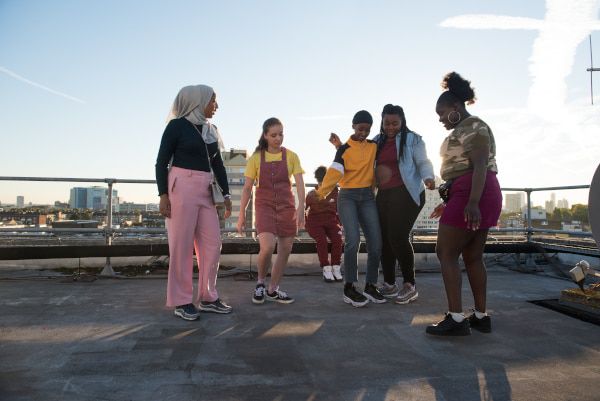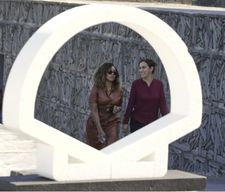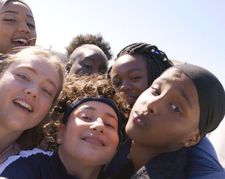You capture the high energy and noise of youngsters - but that must have been quite hard to capture on camera.
Sarah Gavron: Theresa was on set so much of the time, so we kind of collaborated and it was very helpful to me to have other people sharing that role with me. We had to harness that energy. They were bringing huge amounts but their would be moments where, for example, where the social workers came and Bukky was trying to find how she could respond emotionally and it was a moment where I felt like Theresa should come into that situation and talk as the writer and as someone who understood that world so well directly to the cast and Bukky. So, what I'd say is that I had a whole support structure in terms of harnessing that energy but I definitely lost my voice more than I've ever lost my voice on a shoot before.
In terms of the diversity of the cast, did you blind cast it?
TI: It was just any girl and we had loads of girls and a diverse group all the way through. These happened to be the girls who gravitated towards each other. We pretty much say they cast themselves because you couldn't take one girl out of the other six really. That's how they rolled and it would have been devastating and very immoral to separate them and the gift that they brought was their friendship. Not to celebrate that on screen would have been a huge mistake. It was during the workshop process that they became friends and it became about nurturing that friendship and getting to witness it. It was such a joy to watch this thing that's so defining in a woman's life - to find your best friends. To get to see that over the space of a year was such a joy and that's what we wanted to highlight and celebrate.
You have a great director of photography in Hélène Louvart. Can you talk about choosing her.
Beach Rats), Alice Rohrwacher (Happy As Lazzaro), all these heroes of cinema for me, so that was hugely exciting to have her on the team. Then she worked closely with another DP as a second camera operator, called Rachel Clark, and they were almost dancing around the girls and they both formed really sweet, close bonds with the girls, as did all the other crew.How did you manage to build a safe space on location and get these emotions from the young women and from the boy who plays Emmanuel.
Theresa Ikoko: This really was a film made from love so, in that, there was so much safety and there was so much trust. I hope that nobody ever felt uncomfortable. The girls would even say, 'Cut' themselves, if they wanted to have a conversation. So it really was a safe space. In the case of D'angelou Osei Kissiedu, who plays Emmanuel, his closeness with Bukky was what kept him safe. Whenever he couldn't see his mum, he looked to her. They became a real brother and sister off and on camera - loved an hated each other the way siblings do. Bukky did amazingly with him and worked really hard to be his rock on set and they're still very close today.
Can you elaborate more on the use of two cameras?
SG:The idea was that the emphasis on this film would be all about capturing the girls from the inside, so we didn't feel that we were standing back and watching them as removed adults. We just wanted it to feel that we were in their world, we were with them and we were at their level, in terms of the height of the camera and that we were following them, where appropriate. Occasionally we drew attention to what they were looking at, so it was the teenage gaze was what we all called it, the teenage girl gaze rather than anybody else's point of view. The two cameras enabled us that if they did something spontaneous in a take in the way they moved or how they expressed themselves physically, because we had two cameras we didn't have to get the usual coverage and go back and repeat it, we had options in the cutting room and could use that moment of the performance. Helene was really on board - often DPs resist the idea of two cameras. I said right in the first interview that this was the only way we could do it and I'd do it on a couple of things - I did it on Transparent in America and really found it useful because there was a lot of that kind of spontaneity and I had done it on Suffragette. And she didn't resist it at all. She said: 'It's right for this project, let's do it.'
How important was the fact that the technical team was mostly women as well?
SG: You didn't know that was unusual.
Do you have the feeling that things are changing in terms of diversity in film production?
SG: It's interesting because we talked in previous chats about whether we're making strides in the film industry, to incorporate more people from BAME (black and Asian minority ethnic groups) backgrounds - and I think it's very slow and that, particularly, there aren't many women of colour in the film industry, there just aren't. There are five per cent of producers in Britain who are from a BAME background and our producer Ameena Ayub Allen is that five per cent. So I'd say there's a big issue around that and we can't be complacent about it because while on this production we made strides, strides still need to be taken. In terms of women, when I came out of film school 20 years ago, I remember that year, four per cent of films were directed by women and then the next year it was seven per cent and and everyone went, "Whoo!" and the next year it was three per cent and it just sort of teetered for literally 15 years, never rising. So the question of why are there so few women just came up and came up. I would say, and it's just from a personal point of view, that the Me Too movement, in terms of women in the film industry, has really shifted something and Tarana Burke speaking out and everyone jumping on it and Time's Up coming out of that, suddenly there's been a kind of wake-up moment that I feel very grateful for and I hope more projects happen like this and are supported.
TI: People talk about diversity and why there aren't more women of colour in film. We have a lot of institutions that go on about their strategies to diversify and we know really that they consider new talent of colour a risk. A lot of the wording around it is "taking a risk" on this director or "taking a risk" on this writer and we aren't risks, we are great investments that give great returns. It takes women like Sara who will use their platform and men who will use their platform and open doors and then hold the doors open. This was a very different way of making a film and, if we're honest, a black female director would never have got the backing to make a film in this way. We said: 'We don't know what the film's about yet but just trust us.' Because Sara decided to use her platform and hold the door open for an army of women of colour to come through, it means that now, hopefully, I can one day say, 'I'm going to make a film, I don't know what it's about but just trust me'. I think it really does take people to acknowledge their privilege and power an be responsible and generous with that.
SG: I'm grateful to them for what they brought, so it was mutually beneficial.
Do you find your facing obstacles around casting in terms of taking on "box office" names?
SG: I've definitely encountered that and learnt a lot in the process of making Suffragette. It was partly because it was a bigger budget film and it was like, "No, you have to cast in a particular way." With this project, we always knew that we wanted to work with these young people, so that brought with it a certain level of budget but that suited the territory of the film. From the beginning, it was on the table that we weren't going to get known actors, so it was never an issue but it did mean that we had to do a lot of telling the financiers about why this film could work and reassuring them. The producers had this idea - which was very effective - because we were filming in our workshops all the time using our iPhones, of putting together tapes of the workshops that we could share with them. So it was almost like they were feeling invested as we went through.
So, what are your plans for the future?
TI: To keep making films exactly like this in the exact same way because I don't see why you should have to do it any other way apart from doing it surrounded by people who you love, who love the world you are creating and would give absolutely anything for it. And we're going to keep at it.
The film will be released in UK cinemas on April 10, 2020.
- Read about how Theresa Ikoko and Sarah Gavron developed the story and collaborated with their young cast in the first part of our interview.
Share this with others on...
























